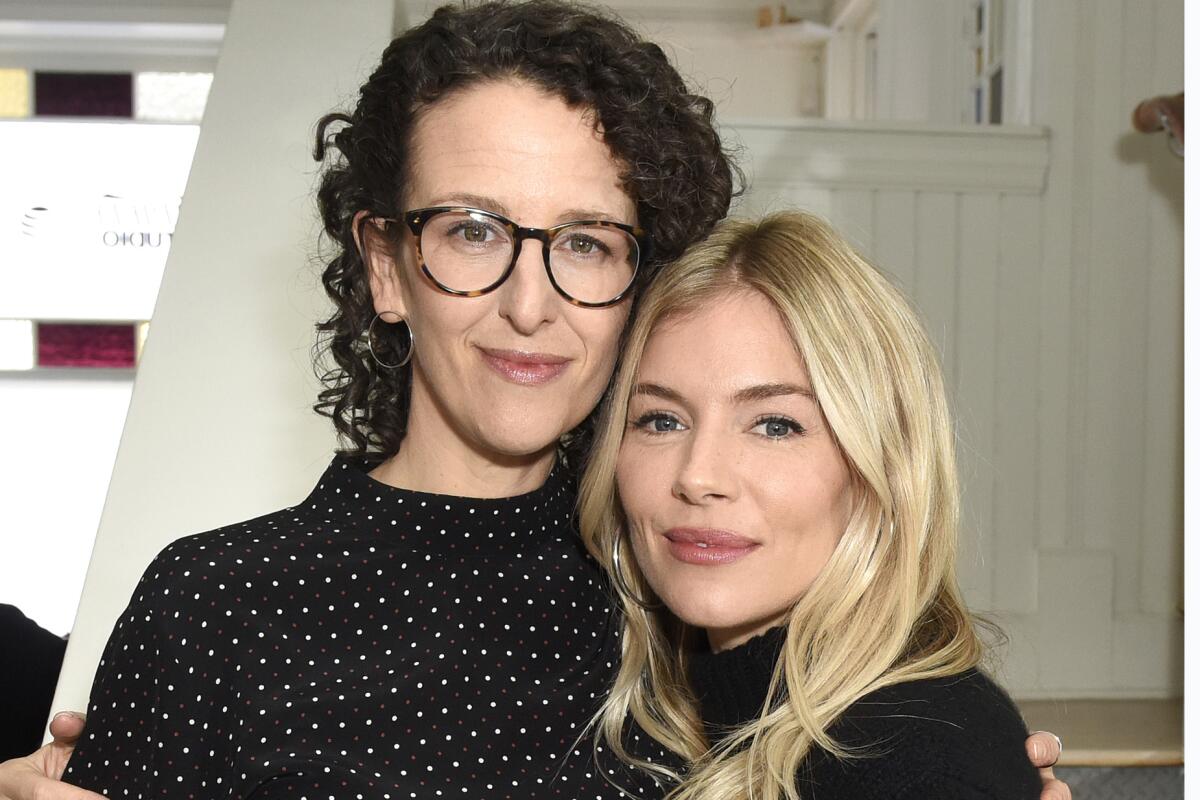‘Wander Darkly’ was born from a head-on crash, chaotic family life, endless gratitude

- Share via
It all began with a car crash that I thought was the end of me.
Several years ago, my husband and I survived a head-on collision. In the aftermath, I was concussed and, just for a moment, certain that I had died. It was as if I was just witnessing what came after: My mother would raise our two baby girls; we would never move into the house we had just bought.
And then, weeks later, during the mad chaos of Thanksgiving dinner, my husband and I were mostly recovered, my parents were fighting over the turkey, our two baby girls were crying, and I was struck with this profound sense of gratitude for our messy, delicate little lives. I wanted to bottle up that feeling and share that feeling with as many people as possible.
For me, that meant taking seven years to make a movie about it.
A confession: I remember very little of the process of writing “Wander Darkly.” I liken the experience of writing a script to giving birth. There’s some biochemical that makes you forget the pain of it so your body can convince itself that it’s a good idea to do it again.
I know that it was months between the time I had that moment of emotional clarity and the night that I woke up burning with the broad strokes of the beginning, middle and end of a story about a couple on the verge of splitting up, a car crash, a woman who believed she had died and her partner determined to help her by telling her their story. I might hate writing, but I am obsessed with the power of story. I also remember that attached to this idea were two satellite certainties: 1) I could channel that feeling I wanted to share through the film and 2) I had to make this movie.
But it was a challenging time. My husband and I were in debt from the car accident and from our recent home purchase. I had a 4-year-old and a baby to raise, was struggling to pay for childcare with the film work I was getting, and (another confession) I sort of hate writing. I find it especially painful when I want it to mean something, when it’s personal or when I’m relying on it to feed my family and to potentially change my life. So I talked about the idea a lot and gauged reactions (gasps!) until my dear friend and producer Lynette Howell Taylor told me I had to go write it.
Her confidence fueled me. And my post-accident clarity was flashing like a warning, declaring that life is short, that this idea was essential, that I had become a filmmaker to connect to people and that I had to do it now. Despite our financial situation, I stopped taking work and committed to writing the script.
This is where my memory about the process gets fuzzy. I knew the structure would be nonlinear, that it would march out more like a spiral than the traditional line of a hero’s journey into the cave. I knew that the characters would break from their flashback memories to engage one another from the present. I knew I wanted to explore the unreliability of memory and the power of story, the similarities between a concussion, the psychosis of grief and the loss of love. I believe I used some note cards. I have evidence on my laptop that I wrote a one-page treatment and then, months later, a 12-page treatment.
That year, my husband, who is a cinematographer (and was the second unit director of photography on “Wander Darkly”!), was shooting in Macon, Ga., for five months. His condo had a pool, so I hatched a plan to take our girls there for five weeks and hire a sitter from 8 to noon weekdays (all we could afford) so I could write the first draft. While the kids splashed away outside, I sat in the clubhouse, blasting Florence and the Machine in my earbuds to drown out the grunts from the adjacent weight room and the critics in my head. I wrote for my life.
That part of writing (the actual writing, not the fear of not being able to write whatever I’m trying to get out of me), I love. I love the flow that comes when you accept that it’s impossible to be perfect and manage to aim for generous and authentic, and manage to get some terribly flawed words on the page. And then if you’re incredibly lucky, as I have been, that authenticity resonates for some people as meaningful, and it feeds your family and it changes your life. That was “Wander Darkly” for me.
I’m recognizing now that this is a remarkably linear telling of the development of a story that has such unusual structure. That said, here I am writing this on the night before our film meets the world and the end of my journey with “Wander Darkly” feels more like a beginning.
More to Read
From the Oscars to the Emmys.
Get the Envelope newsletter for exclusive awards season coverage, behind-the-scenes stories from the Envelope podcast and columnist Glenn Whipp’s must-read analysis.
You may occasionally receive promotional content from the Los Angeles Times.









